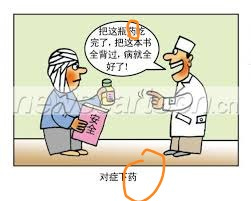Origin: 艹 (the "grass" radical) + 约 (yuē; to restrain)
Guess: What grass/herbs restrain illness? Answer: medicine.
Chinese Culture Lesson: There’s a thing called Traditional Chinese Medicine, where plants and herbs would be harvested for medicinal purposes. That is why, when looking at the character for drug in Chinese, it is related to plants. In fact, modern drugs and medicines only came to China after the Opium Wars in the 1800s. Many have said that Chinese herbs are beneficial to the body, providing an alternative to pharmaceutical medicines.
The traditional Chinese character 藥 (which shares the same definition as the simplified character) has its origin in another route: 樂 + 艹. We know the latter means grass; what does the former mean? Metaphorically, it means healing, harmony, and balance. Literally, it means music and joy. But doesn’t music help heal, balance, and harmonize your pain, and isn’t this the exact function of medicine/pharmaceutical drugs?
WHY IS THIS USEFUL FOR YOU, EVEN IF YOU DON’T LEARN CHINESE?
Because it shows how similar your language — English — is to Chinese. Just as in Chinese, in English, the word medicine also means “to heal, to cure,” stemming from the word mederi in Latin. You can also see the ridges between Western and Eastern culture; in China, people value nature-based and balanced-focused medicine (aka the Traditional Chinese Medicine I talked about earlier). In the West, pharmacies reign supreme.
WANNA IMPRESS A CHINESE PERSON?
Say this: “While I was solving a math problem, I had to be 对症下药, because if I didn’t apply the right formula, I would get a wrong answer.” Basically, the Chinese expression you’re saying — 对症下药 (duì zhèng xià yào) —means diagnosing the issue before applying a remedy. In your case, your issue = math quesion; your remedy = formula.
(The 1st YouTube video is the explanation of Chinese idiom; second is the pronunciation of 药)





thoroughly explained. 解释得很透彻